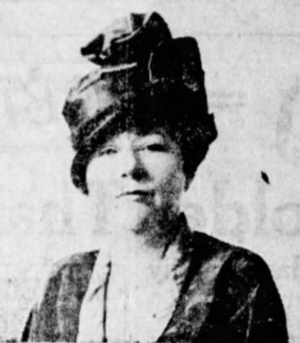Edith Rogers (Manitoba politician) facts for kids
Edith Florence Rogers (born Edith Florence McTavish, April 26, 1876—April 19, 1947) was an important Métis politician in Manitoba, Canada. She made history as the first woman ever elected to the province's law-making body, the Legislative Assembly of Manitoba. She served there from 1920 to 1932 as a member of the Manitoba Liberal Party.
Contents
Early Life and Family History
Edith Florence McTavish was born on April 26, 1876, in Norway House, Manitoba. Her parents were Lydia Catherine Christie and Donald C. McTavish. Her father was a Chief Factor for the Hudson's Bay Company, a very old trading company.
Edith's family had deep roots in Manitoba's past. Her great-grandfather, Alexander Christie, was a governor of Assiniboia twice. He also helped build Fort Garry, an important historic site. Her grandfather, William J. Christie, also worked for the Hudson's Bay Company for many years.
When Edith was two years old, her family moved from Norway House, which is far north of Winnipeg, to Rupert House, near James Bay.
Helping Others and Marriage
Edith went to school in Montreal. After finishing her studies, she moved to Winnipeg. In 1898, she married Robert Arthur Rogers, who was a businessman.
Edith became well-known for her charity work, especially after World War I began in 1914. She worked for the Patriotic Fund, which gave money to the families of soldiers fighting overseas. She was known for spending many hours talking with these families to help them. She also worked with groups like the Salvation Army and the Red Cross.
Political Journey
In 1916, the government in Manitoba passed a law that gave women the right to vote. This was a big step forward!
In 1920, the Liberal Party asked Edith Rogers to run for election in the Winnipeg area. This area elected ten members at once using a special voting system. She agreed to run in the 1920 provincial election. She was successfully elected, becoming the first woman to join the Manitoba legislature.
For the next two years, Edith supported the government. She cared a lot about issues affecting soldiers returning from war and people who didn't have jobs. She helped pass Manitoba's Child Welfare Act, which was a law to protect children. She also supported the idea of stopping the sale of alcohol.
However, her election did not mean that Métis people or women gained a lot more political power right away.
In the 1922 provincial election, the Liberals lost to the United Farmers of Manitoba. Edith Rogers was re-elected in Winnipeg. She often spoke out against cuts to social services made by the new government.
Edith was elected one last time in the 1927 election, which the Liberals also lost. In 1928, she represented Canada at a big meeting in Geneva. This meeting was about stopping bans on importing and exporting goods. Her husband passed away in 1929, and she decided not to run for re-election in 1932.
Later Life and Legacy
Edith went back to her charity work during World War II. She led the Red Cross's Provincial War Council. She retired in 1942 and passed away five years later in Colborne, Ontario.
Edith Rogers's daughter, Margaret Konantz, also became a politician. She was a Liberal member of the House of Commons of Canada from 1963 to 1965. Margaret was the first woman from Manitoba to be elected as a federal Member of Parliament.


